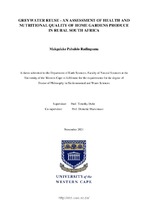| dc.contributor.advisor | Dube, Timothy | |
| dc.contributor.author | Radingoana, Makgalake Pabalelo | |
| dc.date.accessioned | 2022-01-19T08:36:40Z | |
| dc.date.available | 2022-01-19T08:36:40Z | |
| dc.date.issued | 2021 | |
| dc.identifier.uri | http://hdl.handle.net/11394/8611 | |
| dc.description | Philosophiae Doctor - PhD | en_US |
| dc.description.abstract | The majority of rural communities in sub-Saharan Africa are predominantly poor and depend largely on small-scale subsistence farming. To date, various farming mechanisms (e.g. organic farming, crop rotation, agroforestry and inter-cropping) have been introduced to improve food security and to avert hunger; however, water scarcity remains a challenge. The sub-Saharan African region is currently regarded as water stressed and this has had a significant impact on rural livelihoods. Despite being considered as a water-scarce region, the demand for water for agricultural purposes continues to increase exponentially, while, on the other hand, its supply keeps on diminishing, particularly for agricultural production. | en_US |
| dc.language.iso | en | en_US |
| dc.publisher | University of Western Cape | en_US |
| dc.subject | Crop production | en_US |
| dc.subject | Greywater re-use | en_US |
| dc.subject | Home gardening | en_US |
| dc.subject | Heavy metals | en_US |
| dc.subject | Soil quality | en_US |
| dc.title | Greywater reuse - An assessment of health and nutritional quality of home gardens produce in rural South Africa | en_US |
| dc.rights.holder | University of Western Cape | en_US |

